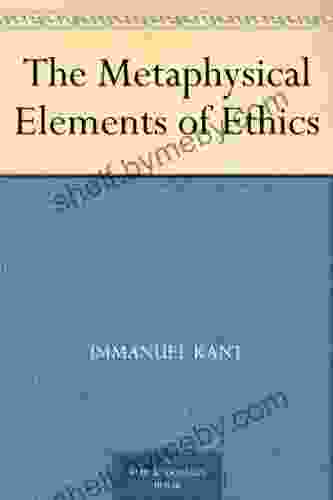Ethics, the study of morality, has perplexed philosophers and theologians for centuries. What is the basis of right and wrong? Where do our moral obligations come from? The Metaphysical Elements of Ethics, a seminal work by German philosopher Immanuel Kant, offers a profound exploration of these fundamental questions.
Kant's Critical Philosophy
Immanuel Kant (1724-1804) was one of the most influential philosophers in history. His critical philosophy sought to establish the limits of human reason and the nature of our knowledge. Kant argued that true knowledge is not derived from sensory experience alone but also from the categories and concepts that our minds impose on the world.
4.4 out of 5
| Language | : | English |
| File size | : | 120 KB |
| Text-to-Speech | : | Enabled |
| Screen Reader | : | Supported |
| Enhanced typesetting | : | Enabled |
| Word Wise | : | Enabled |
| Print length | : | 30 pages |
| Lending | : | Enabled |
The Critique of Pure Reason
In his Critique of Pure Reason, Kant laid the foundation for his ethical theory. He argued that the human mind possesses certain innate, a priori concepts, such as space, time, and causality. These concepts are not derived from experience but are essential to our understanding of reality.
The Moral Law
Kant believed that ethics is not based on experience or personal preferences but on a universal, objective moral law. This law is not something that we discover or invent but, rather, something that is binding on all rational beings.
According to Kant, the moral law is known through our practical reason. Practical reason is the faculty of the mind that enables us to distinguish between right and wrong. It guides our actions and provides us with a sense of moral obligation.
The Categorical Imperative
The categorical imperative is the core principle of Kant's ethical theory. It states that we should act only according to those maxims (rules of conduct) that we could at the same time will to become universal laws. In other words, our actions should be such that we could consistently will everyone else to perform them.
The categorical imperative is a formal principle that does not specify what is right or wrong in particular situations. However, it provides a framework for evaluating the morality of our actions.
The Metaphysics of Ethics
In The Metaphysical Elements of Ethics, Kant elaborates on the metaphysical foundations of his ethical theory. He argues that the moral law is grounded in the noumenal, or transcendental, realm of reality. This realm is beyond our sensory experience but is accessible through our practical reason.
Kant believed that the noumenal realm is the source of our moral obligations. The moral law is not something that is imposed on us from the outside but, rather, something that we freely choose to follow.
Autonomy and Freedom
Kant emphasized the importance of autonomy in ethics. Autonomy is the state of being self-governing and not subject to external control. Kant believed that only autonomous beings can truly be moral agents.
According to Kant, autonomy is grounded in our freedom. We are free to choose our own actions and to determine our own moral destiny. This freedom is essential for our moral responsibility.
The Kingdom of Ends
Kant envisioned an ideal moral community, which he called the kingdom of ends. In the kingdom of ends, all rational beings would act according to the moral law and treat one another with respect and dignity.
Kant believed that the kingdom of ends is not a utopian dream but a real possibility that we can strive for. By acting in accordance with the moral law, we can contribute to the creation of a better and more just world.
The Legacy of Kant's Ethics
The Metaphysical Elements of Ethics has had a profound impact on the development of Western ethics. Kant's emphasis on the universal moral law, autonomy, and freedom has shaped the thinking of generations of philosophers and moralists.
Kant's ethical theory is not without its critics. Some argue that it is too abstract and that it fails to provide sufficient guidance for practical decision-making. However, there is no doubt that Kant's work has made a significant contribution to our understanding of morality and its metaphysical foundations.
The Metaphysical Elements of Ethics is a challenging and rewarding work that offers a deep and insightful exploration of the nature of morality. Kant's ethical theory is based on the idea that we are rational beings who are capable of freely choosing the right course of action.
Kant's work has had a profound impact on Western ethics and continues to be a source of inspiration for philosophers and moralists today. It is a must-read for anyone interested in understanding the philosophical foundations of morality.


























































































